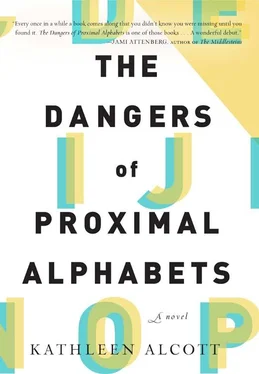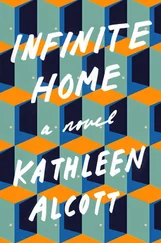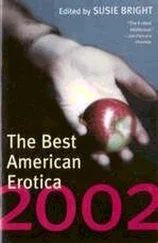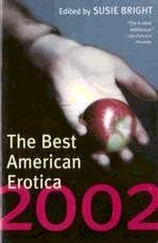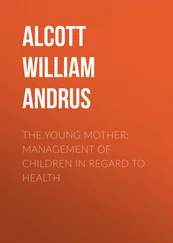A false cognate that’s always struck me: in French, “attendre” is not to attend but to wait. How different the structures of being there, present and participating, and waiting, how palpable the confusion between the two. I supposed I was expecting him to get somewhere. It’s a form of waiting that’s harmful, in that you’re really not anticipating any external force but rather some clear and brash interior shift. And did he ever get somewhere, bubbling over in a way that altered the course of our lives, though it was a different kind of destination, a different kind of event, than I was hoping for. I had plans for him of therapeutic transcendence, the wish that he could feel like the gruesome things he’d done while nightmaring had at least added up to a whole he could look at, examine, maybe experience a sense of pride. Instead they pushed him in another direction, instead they asserted his suspicion that no matter how he measured himself, there was this other darkness that insisted on living (and loudly).
I’d hoped it’d be a gift. Hoped he would feel, at last, forgiveness, support. The sense that however much he writhed, it was to a point. And selfishly, perhaps, I wanted him to look around and see that I’d accepted his worst and loved it.
It hurts to replay those conversations and find evidence of his effort, recognize his keens as a love I named insufficient. Of course I remember, he would say. Just in a different way. I remember by never putting too many ice cubes in your drink, because your teeth are ultrasensitive to cold. I remember by watching where you put your keys and pointing them out to you later. I remember when it’s early in the morning and I’m in the shower feeling the BB pellet you put in my back. I remember by watching you while you cross a room with the same stride you’ve always had, uneven and heavier on the right foot and bold. I remember by not having to explain myself. I remember. I remember. I remember.

Whether Jackson remained with James for days or weeks was never revealed to me. I only know that he stayed in his apartment and accepted kindnesses from the brother he’d barely spoken to — save the visit we made to him in the hospital, during which Jackson hardly opened his mouth — since we sat in a small room with no windows and James told us about the swings of the baseball bat, the sudden and encompassing swirl of blue and red lights. If they talked about the trial, Jackson’s guilt/remorse/resentment, the science-fiction novels and bland ham sandwiches James devoured in jail, the years in between, the bruises Jackson’s sleep left on my breasts and neck, neither chose to tell me.
Years and years and moments upon moments were suddenly negated. Since childhood I’ve spent my heart and words and a catalog of tiny, insignificant moments trying to merge with a bloodstream not mine. The achievements of assimilation many; the failures less often but grander in scale. My father had to take me aside when I was six and explain to me that while it might feel like it, honey, James and Jackson are not your brothers, and so it’s no good to be running around calling them that. And I crawled into his lap and cried and choked and gasped until I couldn’t, fingering the ivory buttons on his rough linen shirt and feeling, for the first time, the pain in trying to understand the word that should be simple: family . If not my brothers, then what, I asked? And he taught me another word that should be simple: friends .
And so while James brought Jackson food and books and the oatmeal soap he requested, I sat in the apartment my past bequeathed me and slowly began making the phone calls that other people dread answering. I swallowed my pride and a great deal of anti-anxiety medication Paul had brought, like everything else, without my asking.
These are the type of phone calls that everyone receives from time to time but that no one wants to admit making. They are to people one hasn’t spoken to in a significant amount of time, and they involve self-centered apologies, circuitous anecdotes, the repetition of stock phrases “I don’t know,” “It’s just that,” “If only.”
I had let myself forget: that honest-to-goodness, forever families are made of blood. That a history doesn’t guarantee a future. That no matter how many secrets Jackson and I had told each other; no matter how many times we’d returned home to find the other waiting; no matter how many seasonal colds and flus we’d spread back and forth, taking turns playing nurse; no matter how many, no matter how much, he was not my family. And neither was James, who was happy to be reunited with Jackson and wonder sweetly at the common acids, pigmentations, and chromosomal intersections.
I called friends and feigned interest in catching up, but their good news made me resent them and their bad news paled in comparison to mine. Those who knew me more intimately let me cut to the chase, rehash the last three or five or twenty years of the relationship. And what I wanted was someone to simmer incredulously with me, to deny that all of this would last, but they always offered advice. I should take up jogging or tennis or, one suggested after I rejected everything else, perhaps smoking again, at least temporarily. The majority of conversations ended this way, but still I went on making the phone calls, “reaching out,” using words and terms like “profoundly sad” and “head space” and “grief” and “I wish he would just call and let me know where he is” and a great deal of expletives.
“Fuck,” I would say, after I’d exhausted the story for the fifth time that day. “Fuck!”
Besides friends I’d forgotten — who’d essentially forgotten about me — I called my father, who listened but would not commiserate.
“Dear heart,” he said with a sigh, “I want you to hear what I’m about to say and try not to be angry.
“You and Jackson …” he said, and all I heard was the familiarity of our names once again united, “… you and Jackson have had your time. I’m an old man, and I know what I’m saying when I tell you that just because you love someone, Peaches, just because you love someone doesn’t mean they’re right. For you. At least not forever. And how many times, Ida — how many times have I picked up the phone to you in a state of absolute disrepair because you’ve woken up to him gone? How many times have you worn long sleeves in the summer — I don’t care if it’s not his fault he hurts you, Ida, but the truth is he does. And you hurt each other. You’re my child and Jackson might as well be, and don’t hate me for saying this, honey, but I think he was right to go.”
When I had run out of old friends to call, and even my father said he’d be happy to talk with me about anything but Jackson, I began calling James’s hotel. He was required to pick up and so I was able to get in a few angry words, hammer out a few reluctant answers, but after two weeks he convinced his boss of a frequent prank caller and the need of a little box that he glanced at, then ignored, while the telephone wires ached and the numbers of my location pulsed and pulsed and pulsed.

Amid all of this, my father and Julia undertook partnership wholeheartedly, almost as if it were their profession. They made an art form of consideration, compassion, frequently stumbling over each other to accommodate. Rolls of Tums showed up with the slightest mention of stomach upset, you-shouldn’t-haves exchanged like currency. Whatever tension there’d been decades ago, as young parents trying to survive in different ways, they relegated this like an old couch for the sake of something more comfortable. She moved from the room where I had slept as a child to his. Though they slept in the same bed, we understood this was not for the sake of lust but nearness; Julia wanted to be there in the middle of the night if my father’s breath grew troubled, and he felt obligated to receive whatever end-of-the-day or postdream thoughts she offered. In a word, Julia navigated all things physical and tangible for the both of them — trips to the post office and the pharmacy, groceries, whole days mopping and sweeping — and my father held her hand and listened, read her short stories by Latin American authors about little boys sailing and drowning in a sea of light.
Читать дальше
